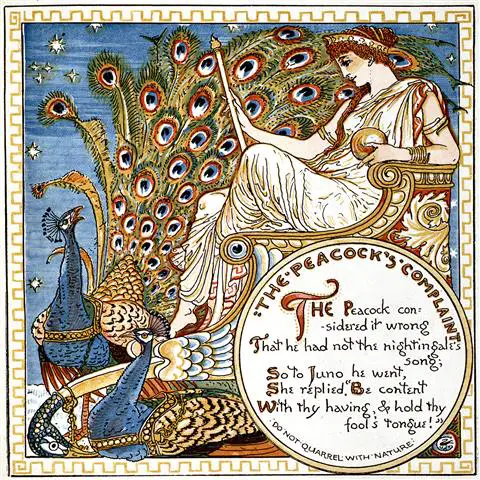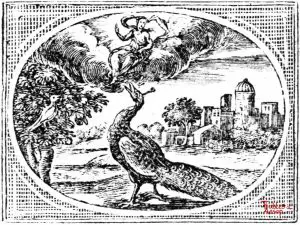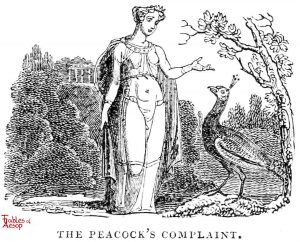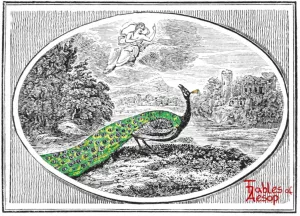A Peacock wanted to have a nice voice as well as looking pretty. Juno said: “No.”
Be content with your lot; one cannot be first in everything.

Eliot/Jacobs Version
A Peacock once placed a petition before Juno desiring to have the voice of a nightingale in addition to his other attractions; but Juno refused his request. When he persisted, and pointed out that he was her favourite bird, she said: “Be content with your lot; one cannot be first in everything.”

Townsend version
The peacock made complaint to Juno that, while the nightingale pleased every ear with his song, he himself no sooner opened his mouth than he became a laughingstock to all who heard him. The Goddess, to console him, said, “But you far excel in beauty and in size. The splendor of the emerald shines in your neck and you unfold a tail gorgeous with painted plumage.” “But for what purpose have I,” said the bird, “this dumb beauty so long as I am surpassed in song?’ “The lot of each,” replied Juno, “has been assigned by the will of the Fates–to thee, beauty; to the eagle, strength; to the nightingale, song; to the raven, favorable, and to the crow, unfavorable auguries. These are all contented with the endowments allotted to them.”

Samuel Croxall
THE Peacock presented a memorial to Juno, importing, how hardly he thought he was used, in not having so good a voice as the Nightingale: how that pretty animal was agreeable to every ear that: heard it, while he was laughed at for his ugly screaming noise, if he did but open his mouth. The Goddess, concerned at the uneasiness of her favourite bird, answered him very kindly to this purpose: If the Nightingale is blest with a fine voice, you have the advantage in point of beauty and largeness of person. Ah! says he, but what avails my silent unmeaning beauty, when I am so far excelled in voice! The Goddess dismissed him, bidding him consider, that the properties of every creature were appointed by the decree of fate; to him beauty; strength to the Eagle; to the Nightingale a voice of melody; the faculty of speech to the Parrot; and to the Dove innocence. That each of these was contented with his own peculiar quality: and, unless he had a mind to be miserable, he must learn to be so too.
THE APPLICATION
Since all things (as Juno says) are fixed by the eternal and unalterable decree of fate, how absurd it is to hear people complaining and tormenting themselves for that which it is impossible ever to obtain? They who are ambitious of having more good qualities, since that is impracticable, should spare no pains to cultivate and recommend those they have; which, a sourness and peevishness of temper, instead of improving, will certainly lessen and impair, whether they are of the mind or body. If we had all the desirable properties in the world, we could be no more than easy and contented with them; and if a man, by a right way of thinking, can reconcile himself to his own condition, whatever it be, he will fall little short of the most complete state that mortals ever enjoyed.

Thomas Bewick (Juno and The Peacock)
The Peacock complained to Juno, how hardly he was used in not having so good a voice as the Nightingale. That little bird, says he, charms every ear with his melody, while my hoarse screamings disgust every one who hears them. The Goddess, concerned at the uneasiness of her favourite bird, answered him very kindly to this purpose: If the Nightingale be blest with a fine voice, you have the advantage in point of beauty and majesty of person. Ah! said the Peacock, but what avails my silent unmeaning beauty, when I am so far excelled in voice? The Goddess dismissed him with this advice: Consider that the properties of every creature were appointed by the decree of fate: to you beauty; strength to the Eagle; to the Nightingale a voice of melody; the faculty of speech to the Parrot; and to the Dove innocence. Each of these is contented with his own peculiar quality; and unless you have a mind to be miserable, you must learn to be so too.
APPLICATION.
The most useful lesson that we can possibly learn, towards the attainment of happiness in this world, is to enjoy those blessings that we have in our power, without vainly pining after those which we have not. Instead of being ambitious of having more endowments than nature has allotted to us, we should spare no pains to cultivate those we have; and which a sourness or peevishness of temper, instead of improving, will certainly lessen and impair. Whoever neglects the happiness within his reach, in order to brood over the consideration of how much happier he might have been, had his situation been like that of others, ingeniously contrives to torment himself, and opens a perpetual source of discontent, which prevents his ever being at ease. He does not reflect, or he would soon discover, that all the desirable properties in the world never centered in one man, and that those who have had the greatest share of them, if of an unhappy disposition, still wished for something more, and wanted to possess some inherent gifts which shone forth in other men: but such persons ought to be put in mind, that it does not become mortals to repine at the will of Heaven, which distributes happiness with an equal hand upon the highest and the lowest of mankind, if they were wise enough, and grateful enough, to perceive it.

JBR Collection
The Peacock complained to Juno that while every one laughed at his voice, an insignificant creature like the Nightingale had a note that delighted everybody. Juno, angry at the unreasonableness of her favourite bird, scolded him in the following terms: “Envious bird that you are, I am sure you have no cause to complain. On your neck shine all the colours of the rainbow, and your extended tail shows like a mass of gems. No living being has every good thing to its own share. The falcon is endowed with swiftness, the eagle, strength, the parrot, speech, the raven, the gift of augury, and the nightingale, with a melodious note, while you have both size and beauty. Cease then to complain, or the gifts you have shall be taken away.”

L’Estrange version
The peacock, they say, lay’d it extremely to heart, that being Juno’s darling-bird, he had not the nightingale’s voice superadded to the beauty of his own plumes. Upon this subject he petition’d his patroness, who gave him for answer, that Providence had assign’d every bird its proportion, and so bad him content himself with his lot.
Moral
The bounties of heaven are in such manner distributed, that every living creature has its share; beside, that to desire things against nature, is effectually to blame the very author of nature it self.

Crane Poetry Visual

The Peacock considered it wrong
That he had not the nightingale’s song;
So to Juno he went,
She replied, “Be content
With thy having, & hold thy fool’s tongue!”
Do not quarrel with nature.

Pavo et Iuno
Pavo graviter conquerebatur apud Iunonem, dominam suam, quod vocis suavitas sibi negata esset dum luscinia, avis tam parum decora, cantu excellat. Cui Iuno “Et merito,” inquit, “non enim omnia bona in unum conferri oportuit.”
Perry #509


